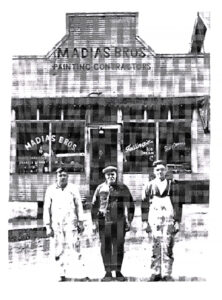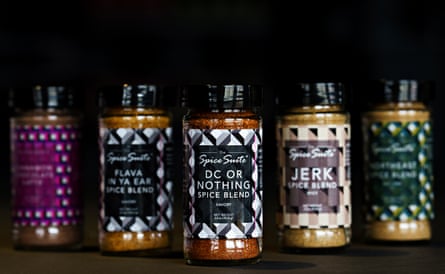[ad_1]
- The business’ first location at 1035 Fourth Ave. in Weirton. Standing in front of it are Gus Madias, Nicholas A. Madias and Marcos A. Madias. — Contributed
- Karen Madias represents fourth-generation involvement in the family business Madias Brothers Inc. in Detroit, Mich., that had its roots in Weirton. The painting and decorating business is celebrating its 100th anniversary this year with weekend observances including a dinner Sunday. Karen is the family historian and daughter of Nick and Virginia Madias. Her father grew up in Weirton on Avenue A. In honor of the centennial milestone, Karen prepared a special history booklet that includes old photos. — Contributed
- TAKING A BREAK — Four painters on scaffolding take a break from their labor in this photo taken at the original All Saints Greek Orthodox Church in Weirton, which was being painted by Madias Brothers Painting contractors, according to Karen Madias. — Contributed
- RESTARTING PROGRAM — Bobbyjon Bauman, left, director of the Sycamore Youth Center at 301 N. Fourth St., Steubenville, recently solidified plans with Capts. Mike and Angie Smith of the Salvation Army of Steubenville to restart a program called the Rangers Adventure Corp (Boys) and Girl Guards for students in grades five through 12. “This program successfully ran at Sycamore a few years ago (pre-COVID), and we are thrilled to have it back,” Bauman said. The students earn badges in cooking, sewing, service, woodworking, etc., just like in other scouting programs. The group will meet every Friday from 4 p.m. to 4:45 p.m. starting Oct. 7. To sign up for this or one of the center’s other 53 programs, go to www.sycamorecenter.com/classes. — Contributed

The business’ first location at 1035 Fourth Ave. in Weirton. Standing in front of it are Gus Madias, Nicholas A. Madias and Marcos A. Madias. — Contributed
Karen Madias represents fourth-generation involvement in the family business Madias Brothers Inc. that has its roots in Weirton dating back to 1922.
And she is one of only two direct descendants connected to the now Detroit, Mich.-based painting and decorating business formally celebrating its centennial year this weekend with a full slate of festivities.
But perhaps her most important and fulfilling “job” this year has been helping the business mark “100 Years of Excellence” through the role she embraces as family historian.
In March, Karen reached out to the Herald-Star and The Weirton Daily Times, sending a copy of the 100-year anniversary brochure celebrating and recognizing the story of the Madias family who settled in Weirton in 1919 and established the Madias Painting Co. three years later at 1035 Fourth Ave., Weirton. Fourth Avenue would be just south of County Road.
She pitched the story idea as a positive one having local beginnings, a business that had painted Weirton Steel Co. in 1922 and the original All Saints Greek Orthodox Church in Weirton, the cornerstone of which was placed in 1916 and where the first service was held on March 25, 1918.

Karen Madias represents fourth-generation involvement in the family business Madias Brothers Inc. in Detroit, Mich., that had its roots in Weirton. The painting and decorating business is celebrating its 100th anniversary this year with weekend observances including a dinner Sunday. Karen is the family historian and daughter of Nick and Virginia Madias. Her father grew up in Weirton on Avenue A. In honor of the centennial milestone, Karen prepared a special history booklet that includes old photos. — Contributed
The business is in the midst of a three-day celebration.
Friday was an open house with tours and photo opportunities at Madias Brothers Inc. headquarters at 12850 Evergreen Road in Detroit.
Saturday is a dinner celebration, and Sunday sets aside time for a memorial service for Madias family members at the conclusion of Divine Liturgy at Sts. Constantine and Helen Greek Orthodox Church in Westland, Mich.
Back in the spring, Karen wondered if any of this was story-worthy for the local newspapers.
A SPECIAL PROJECT

TAKING A BREAK — Four painters on scaffolding take a break from their labor in this photo taken at the original All Saints Greek Orthodox Church in Weirton, which was being painted by Madias Brothers Painting contractors, according to Karen Madias. — Contributed
The commemorative booklet titled “Our Story — 100 Years of Excellence” was Karen’s idea — a project that involved a little more than three months to compile.
“I wanted to tell the story of our ancestors and their hard work and determination to make a successful painting business,” Karen explained in follow-up contact communication.
“They deserved the honor and recognition for their vision,” she noted of an effort that included interviewing relatives and drawing on her past family history work.
Annette Madias, Karen’s cousin, assisted with the layout and design.
There were 400 booklets printed, some mailed to out-of-town family and business customers and friends with many more e-mailed. Booklets were given to current employees, too, and “all who have been touched by Madias in some capacity.”
She prepared an addendum as well, a compilation of photos past and present, reminiscences, stories and documents from what she describes as being a more personal perspective. It was to be distributed to dinner guests.
“As a young girl I was intrigued by the rich heritage of our family and began correspondence with a relative who lived in London and also had a home in Greece,” she said of how her interest in family history originated. “He wrote me volumes of letters detailing our genealogy. I still have his letters. That is how it first began. Over the years, this evolved into my being known as the family historian,” explained Karen, who was born in 1954, the daughter of Nick and Virginia Madias. Her father was born in Steubenville and grew up in Weirton on Avenue A. He was an altar boy at All Saints Greek Orthodox Church.
“My parents greatly encouraged me and helped fill in many blanks,” Karen said of her efforts buoyed “mostly by word of mouth — the oral tradition — of stories, which I wrote down and have kept in my archives.”
“In 1982 we held a huge reunion, and in 2015 we had a smaller reunion. In between, the family would hold a ‘family dinner’ at least once a year. We have continued our closeness even though many have moved out of town,” she said of such gatherings that would be the backdrop for stories of the past to surface and be shared.
THE SEED WAS PLANTED
The cover photo of Karen’s booklet shows the business’ first location at 1035 Fourth Ave. in Weirton.
Standing in front of it are Gus Madias, her uncle; her great-grandfather, Nicholas A. Madias; and her grandfather, Marcos A. Madias.
The woman in the doorway, only slightly visible, though, is their sister, Angero.
“Some family members lived in the back of that store and in the basement,” Karen explained. “A kitchen was in the basement, and Uncle Gus would make the Loukoumathes, a small fried doughnut delicacy, daily in that kitchen. Angero would sell those to customers walking by the store.” It would constitute their confectionary store in town with ice cream also sold in addition to soda and candy, the Loukoumathes and paint supplies.
“The seed was planted in the year 1922 by three brothers, Marcos, Gust and Michael, along with their father, Nicholas, in the hills of the small, steel town of Weirton, W.Va.,” Karen’s written history of the painting business begins.
But the story, she points out, goes back to the island of Chios, Greece, and the tiny seaside village of Kardamila. Life was difficult in Greece then, she wrote, so in 1915 the three brothers traveled by ship to the United States in search of the American dream, living with relatives in New York and working small paint jobs.
Marcos, the oldest brother, enlisted in the U.S. Infantry on Dec. 23, 1917. It was the start of World War I. “In April of 1918, Marcos was deployed to active duty in France where he faced combat at the Marne and was wounded. Marcos received an honorable discharge and returned to the United States in 1919 an American citizen,” Karen wrote. He was awarded the Purple Heart.
The brothers would leave New York, heading to Weirton by railcar to work in the steel mills. Their earnings would enable them to send for their parents and other family members. Their father, Nicholas, would arrive from Greece in 1920. Their mother, Maritsa, and younger children came four years later.
“But life working in a steel mill was not their vision,” Karen wrote. “After two years working in the mills, the Weirton Steel Co. began taking bids for the complete painting of the factory. The brothers bid the project and were awarded the job. The work took two years to complete, and it firmly established the Madias family in the paint contracting business. Madias Painting Co. was born.”
Word traveled quickly about their strong work ethic and honesty, increasing their work load. “The brothers worked hard during the Depression year,” Karen noted. Their father died in 1937 and was buried in Paris Cemetery.
The decision to move from Weirton to Detroit came during the early 1940s because there was much work there. “The Madias brothers bought a rickety old bus, filled it with all their supplies and belongings” and drove to Detroit.
Their first major project was to paint three Detroit public schools.
“The move from Weirton to Detroit was based on Uncle Alex — an original brother, but younger — bidding the Federal Building in Detroit in 1946,” Karen explained in an e-mail. “Madias was awarded the contract at a price of $37,000. This prompted the move to Detroit,” she added, noting that eventually, all of the family relocated to Detroit, which is 270 miles from Weirton.
MOTORING ALONG IN DETROIT
In 1946, the brothers bought property at 14710 Plymouth Road in Detroit. “From this building they sold paint and hardware supplies and home products such as dishes, lamps, linens and furniture. They even sold Christmas trees and decorations,” Karen wrote of the building that would become known as “The Store.”
The company bid and was awarded many contracts with the federal government. Large projects included Wurtsmith Air Force Base, work in the Upper Peninsula of Michigan, the ongoing painting of many Detroit Public Schools “and, of course, the automotive industry was booming.”
“The Store” transitioned into “The Office,” according to Karen, who noted business relationships grew throughout the 1950s “and some continue to this day, which is very interesting and unique. One example of this valued relationship includes the old General Motors Building which was located on W. Gran Boulevard in Detroit and is now headquartered at the Detroit Renaissance Center,” Karen noted.
Madias Brothers had a small office located in the old GM Building basement. “It was from this small office that Madias Brothers provided daily tenant work for General Motors. Madias Brothers continues to this day, servicing General Motors at their headquarters in the Ren Cen,” wrote Karen.
Feb. 20, 1962, marked the date of incorporation for the Madias Brothers in Michigan. The company expanded to include an industrial waste removal company and a janitorial services company. Trucking services were provided to the Ford Wixom plant among others, and janitorial services to companies such as Michigan Bell and the Ford Mazda Plant in Flat Rock, Mich.
Growth prompted the need for bigger facilities and brought the 1972 purchase of a larger building. After the move to Evergreen Road, the Madias Child Development Center took over that space for many years.
Some of the projects awarded during this time included Detroit Ren Cen, Cobo Center, Ford Auditorium, Tiger Stadium, Ford Field, Comerica Park, the Dearborn Inn, Henry Ford Hospital and the MGM Casino in Detroit, according to Karen’s history.
“While the janitorial services faded, the trucking work expanded from industrial waste removal to include a recycling facility on the property, shipping cardboard and plastics across the Midwest, Canada and overseas. Today it is known as Grove Recycling Services Inc. and is a subsidiary of MBI,” Karen wrote.
IN THE BUSINESS
As a teenager, Karen worked during summer vacations at the offices on Plymouth Road. “ln 1982, I began working full time at the company. I was an administrative assistant, working for the painting division. Since 2014, I began to work for Grove Recycling Services, the recycling/industrial waste division of Madias Brothers, lnc. I am currently accounts payable manager, and handle the scheduling of our inbound and outbound commodities. I also function as an administrative assistant for Grove,” explained Karen, who reminisced about how she only spoke Greek as a child “since my great-grandmother (Maritsa) and grandparents (Marcos and Kyriakoula) lived in our house, and that was basically the language spoken.
“My kindergarten teacher sent a note home asking my parents to please start using English at home. My childhood was all about family and the business and the church. My father, Col. Nick, worked hard to make the painting business a continued success. I recall that he never brought home any work issues — that was all left at the office.”
The addendum includes early reflections from her father, whose company leadership ran from 1972 to 1992.
When the family left Weirton for Detroit, he was 12 and in junior high school, captain of the basketball team. “They had a game that day after school, so Nick was dressed for the basketball game in his uniform. His family drove to the school, and Nick was told to get in the car because they were moving. There were no goodbyes. No discussions. They just left and headed for Detroit,” the story read.
Just as Karen had worked during summer vacations growing up, her daughter, Jennifer, followed suit.
From 1947 to the late 1950s, all relatives were paid the same weekly amount, according to Karen, a practice that changed around 1960 when a salaried structure was established.
“My personal take on the success is that with hard work, honest business relationships, innovation and quality work, the business survived and grew to achieve 100 years,” Karen said of the company’s longevity and success.
“I pray we will achieve another 100 years. May we always remain humble and thankful to our ancestors. They would be very proud and happy.”
[ad_2]
Source link






